Issue No.13 / September 16,2015
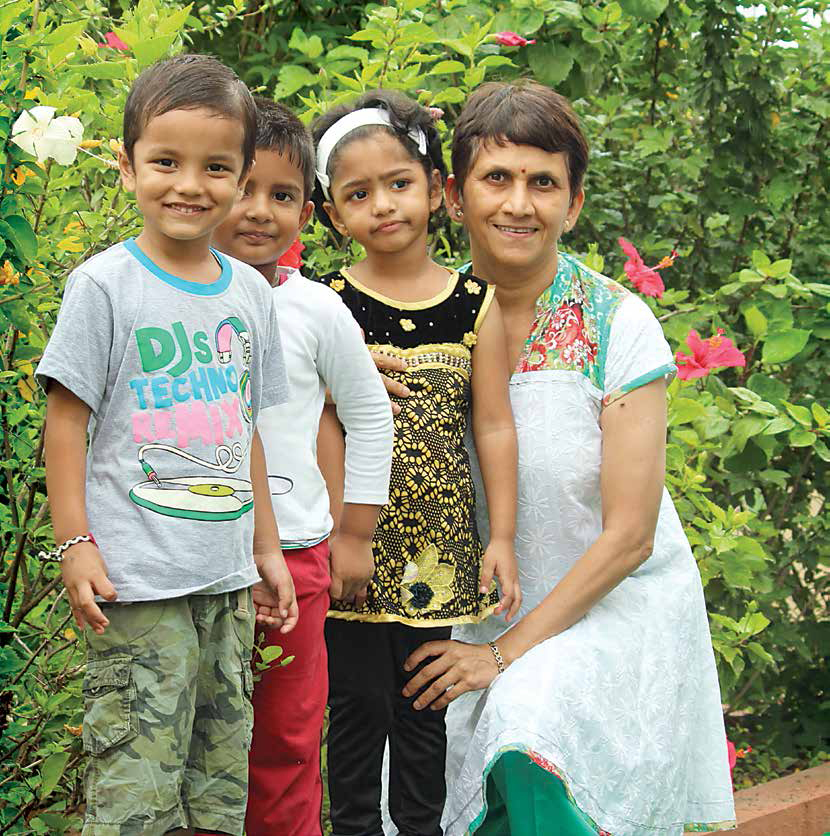
Priti Rao, Former Senior Vice President, Head of Infrastructure Management, at Infosys, quit her high profile job so that she could help at least 1000 women to restart their careers after motherhood. Corporate Citizen meets up with this dynamic lady who has given several hundreds of young women professionals the solace of having their children well looked after at her impressive Pumpkin Patch Daycare in Hinjewadi’s IT neighbourhood of Pune, which now has seven centres spread across the city
A large chunk of my work life – 12 years -- were spent at Infosys, the premier IT company. I got the opportunity to work with many excellent leaders and worked across wide spectrum of IT industry services in its various roles, thanks to the phenomenal growth of Infosys. I had a wonderful time. After a point though, it was getting a bit boring. I also saw young lady engineers joining and performing very well in the beginning years and dropping out of their careers either when they got married or when they had kids. I had taken a two year break when my daughter was born but realised that for most women today that this option doesn’t exist, given the competition and environment. So I thought if I wanted to do something, I would like to help women go back to work. And if a thousand women go back to work, I would have achieved something good in my life. Fortunately, my husband started Pumpkin Patch, a preschool and daycare in 2006. So we thought, why not extend crèche to babies and toddlers too. That’s how the idea of Pumpkin Patch Daycare came into existence in 2009.
We have separated our work in two parts, - one is the pre-school and school plus which my husband looks after, and seven day care centres which I take care of. In the last six years, we have grown from zero to seven centres. Including pre-school and daycare centers, We have 1000+ kids under our care now .
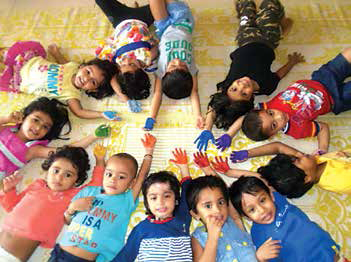
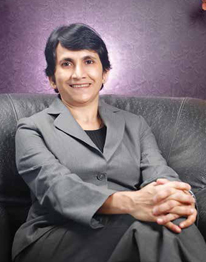
What I have learnt is, being an entrepreneur does not guarantee that you would be a successful entrepreneur. When you become an entrepreneur - in the initial years - right from designing your logo, your website, your catch-line, your payroll, marketing, selling, HR and understanding who should be given PF or ESI - the buck stops at you. I have seen some of my friends and colleagues not realising this. When they are employees of a corporate organisation, yes you are in a good position, the organisation framework be it HR, infrastructure, processes, procedures, measurement, quality is around you -- that’s what one tends to take for granted. When you become an entrepreneur, you have to do all these things yourself; while it is fun one needs to be able to do it. Leadership styles need to change, because when you are in a particular position, you have ‘positional power’. You need to change your style of leadership from a positional power to a personal power. You need to be respected for your strengths and need to lead from the front. These days there is a lot of discussion – on the need to change from masculine values of ambition, aggression and competition, to values of caring, cooperation, compassion. I have realised that I have significantly changed during my journey of transition.
If a drop of water falls in a lake or a sea it has no identity but if it falls on a leaf it shines like a pearl. So, we need to choose the best place to work
I have also understood that just having a good idea will not help. You really need to be talking of measures, defining process and procedures; what exactly your customers need and how do you satisfy your customers. The smallest of these details need to be worked on. There is a lot of hard work that has gone into creating our child safe environment, recruiting and training our staff, defining process, measurements et al.
I have learnt to enjoy the everyday moments of life like a hug from a child; in a butterfly hopping from one flower to another in our garden (We have a beautiful butterfly garden in our centre). There is lot of fun in doing what I do every day. I am a changed person and it has done wonders to me.
‘There is a need to have daycare centres within company premises. We have two centres running at SKF and Sandvik. These exclusive centres are for the children of employees of those companies. It is convenient for employees to have their children nearby’
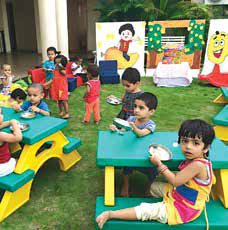
We have looked at the National Association for Education of Young Children (NAEYC) standards, which are US based standards. UK has similar standards too. So we have learnt from these and created our own guidelines, checklists, quality policies, procedures, adapting them to the Indian perspective, because everything cannot be applied directly here.
We have vegetarian meals. We have no safety inspector visits. We have to do our own audits. We have taken the help of consultants who conduct safety audits of the premises. We have CCTV cameras installed everywhere. Lot of parents want to see what their child is doing during the day. We record activities of the whole day that goes on in the daycare, though we do not give internet feeds of what is happening here. I believe that you keep your child here only if you trust us. If I was at Infosys, I wouldn’t want my employee to be looking at the internet feeds of her child at the day care centre. If you are at work, you should peacefully work. So we do not give internet feed, but we have recordings available in an emergency. We have all-women staff, except the watchman. That’s the need of the daycare, as the children are very young, care giving to these young ones is only possible by the women staff.
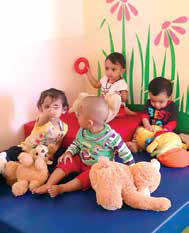
The meals start around 10 a.m. because most kids come by 9 a.m. They have what we call midmorning snack. It is a typical Indian vegetarian meal like, idli, upma, or poha for toddlers. For very small babies who cannot chew, we serve porridge, kichdi similar baby food. Toddlers and after-school care children eat typical Indian vegetarian meals you get at home. Around 11:45 a.m. they have their lunch, with poli, bhaji, varan, rice, salad made to their taste. They sleep after meal and get up at 2.30-3 pm. They have milk and fruit when they wake up. After 5 pm we serve an evening snack like a small dosa or paratha . We don’t use much of biscuits and pastries or processed items, as they are not healthy.
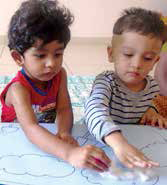
These children come from fairly well to do families so they are generally healthy, but given the pollution, given that they are too young and first time coming out of the house, given the possibilities of illness among few children here, they are exposed to common illnesses. We maintain excellent hygiene at our centres. Sanitisers are kept everywhere, and there is a lot of hand washing routine which is taught to our staff. Even kids don’t eat meals without washing hands. Mildly sick children are separately cared for and really sick children are advised to be at home.

Is there a need for more day care centres like yours in cities, so that a mother does not feel guilty?
Why should somebody feel guilty to work? There is need to have day care centres within the company premises. We have two centres running at SKF and Sandvik. These exclusive centres are for the children of employees of those companies. It is convenient for employees to have their children around. However, most IT companies do not want to have day care centres within their premises, they say it is a risk. Honestly, I think they don’t want to take the responsibility. Manufacturing companies are more inclined, particularly European companies, because it is in their culture.
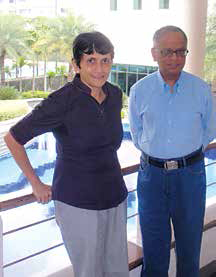
Feeding a child needs a lot of patience; it needs the right type food, the right consistency and it needs the right type of environment where the child enjoys eating. You may be trying to feed while cooking, then the child will not eat. So some mothers find it difficult to feed the child on weekends. Many come and ask us to teach them the recipe.
The striking thing I have observed is that a lot of fathers are taking more interest in bringing up their child, spending time. When a child joins, for the first three days we expect the parents to be around and I have seen a lot of fathers taking turns in parenting. That is a big social change. Fathers are willingly contributing. It is a welcome change I have seen in these last five years.
The number of hugs that I get every day is equal to my previous life’s total hugs. These are small pleasures of life which make it more interesting. Every role has its own privileges , where you enjoy your role, your growth, and get a sense of pride,talking about your business. Working in Infosys was unique. The pleasures of this role are completely different. You have one life; if you want to do many things. I continue to be on the board of management at Mastek . My experience of 24 years is being used in the role of a board member, so it is fulfilling.
Do what you love - I think it is important to select what you really like, when you set out to be an entrepreneur. Life is about the choices you make. Everybody has windows of opportunity. The decisions that you make at those times makes you what you are, and of course there is no choice but to work hard. More than luck, it is about making the right decisions at the right time. Believe in yourself, have courage, and invest in the right kind of people. Surround yourself with people smarter than you, then the job becomes much easier. If a drop of water falls in a lake or a sea it has no identity but if it falls on a leaf it shines like a pearl. Similarly we need to choose the best place to live and work.
By Vinita Deshmukh